
Overpopulation and the Mouse Metaverse
Season 2, Episode 7
⬇️ Download now. – 🌐Torrent (preferred).
The world's population has sky-rocketed from under 1 billion to around 8 billion in only several hundred years? Should we be worried? Overpopulation has become a huge concern among TED talk enthusiasts and social engineer, but is it more than a meme?
We survey the classical views of population growth and its limits starting in Malthus's Principle of Population and how and why his assumptions have been overridden by technological development. Regardless, the 1960's saw a resurgence in Populational Control thinking and the "Zero Population Growth" movement, based in the popular work The Population Bomb by Paul Ehrlich, but also disputed by the optimistic Julian Simon.
Still, one of the more novel issues is that of Behavioral Sinks in modern societies: Industrial economies that are so well off that they population ceases wanting to reproduce or continue normal human life. Modern man is becoming more like the pampered rats in John B. Calhoun's famed Mouse Utopia experiments.
📚 See readings and other media.
Note that pay-walled academic articles may be obtained by feeding their URLs to sites like Sci-Hub.
- The Mouse Population Sink – "Population Density and Social Pathology" by John B. Calhoun
- "An Essay on the Principle of Population" by Robert Malthus
- "Does saving more lives lead to overpopulation?", a video by Bill Gates
- The Population Bomb by Paul Erlich
- The Ultimate Resource by Julian Simon
- The Resourceful Earth by Julian Simon and Herman Kahn
🕓 See timecodes and topics.
00:00:00 TED Talk attendees HATE him!00:01:15 Conspiracies and Georgia Guidestones00:02:38 Today's readings00:04:15 Why should population growth be bad?00:06:54 Malthus and the French Revolution00:09:43 William Godwin as an Osterich00:13:13 Malthuses Principles of Population00:15:50 Carrying Capacity and Well-being00:17:05 Aside on Supply Curves00:20:25 Malthus didn't age well.00:23:48 Soycialism: Utopian and Soyentific00:25:02 Marginalism00:27:31 The Mouse Metaverse and Population Collapse00:31:15 Economic Fragility00:33:40 GMOs and monoculture00:35:36 Mortality Comments00:36:55 Birth control00:40:30 Decline of White People00:43:19 BS Jobs: A YouTube hit. Donations00:47:20 Paul Ehrlich as Lazy Mathusianism00:51:57 Antinatalism00:55:27 The Ehrlich-Simon Bet00:57:40 The Resourceful Earth and the Ultimate Resource01:03:03 The Greater Population Problem in the Mouse Metaverse
The Economy Is Fake, the Jobs Are Fake, the Money Is Fake
Season 2, Episode 6
⬇️ Download now. – 🌐Torrent (preferred).
You can't roast people too badly for being "antiwork" when most jobs are simply useless nowadays. Surveys have shown that around half of people report either their job is totally useless, or that it's unclear to them if there is any social benefit to their work whatsoever. How has this happened? Why do people put so much effort into what is, in effect, play work.
We talk about David Graeber's article, book and concept of Bullshit Jobs, jobs so inane that even the people working them can't justify their existence. This brings up economic questions of hyper-production, the Consoomerist economy, post-scarcity and of course the alleged panacea of Universal Basic Income (UBI).
At the root of all of it is a public-private plastic economy based on easy and highly inflationary money, which strips people of savings and keeps people working like good wagies from cradle to the grade on jobs that exist just to keep the fake economy going. Comments on the psychological effects of Bitcoin and hard money included.
📚 See readings and other media.
Note that pay-walled academic articles may be obtained by feeding their URLs to sites like Sci-Hub.
🕓 See timecodes and topics.
00:00:00 The Fake Economy00:01:09 Virgin antiwork Redditor vs. Chad Fox News00:03:01 David Graeber's BS Jobs00:06:08 An example of a BS job in the German military00:08:09 How many people have fake jobs?00:09:22 Is it just a government problem?00:16:12 The Coofvid Lockdown and "Non-essential workers"00:18:31 Defining Modern Wageslavery and on "Employees" and Time00:22:52 The anatomy of BS job types00:25:30 Goons and Cigarette Ads00:27:09 Fake non-software jobs00:30:25 This is NotRelated.xyz00:31:38 LONG Donation reading00:46:12 The culture of Wagecuckery and Hyperproduction00:49:50 Graeber and the Wagie mindset00:50:17 Universal Basic Income (UBI) and Post-Scarcity00:53:18 UBI and the Wagie Uprising00:56:28 The Inflation Run00:59:09 Should I care about inflation?01:00:06 Life in a deflationary economy01:02:19 What are BS jobs in the inflationary economy?01:04:38 Would Graeber agree?01:06:01 Inflation as theft01:07:07 Why high GDP is bad01:09:36 The example of the Bitcoiner mindset01:10:54 Will gold and Bitcoin destroy the economy? Yes.01:13:38 Hard Money and Bullsh*t Jobs: The Endgame01:15:09 Fake Anarchism and UBI01:16:20 Comments on Left and Right Anarchism01:18:18 Closing Notes, including *important* RSS updates!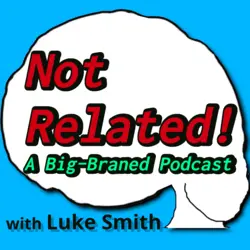
Popper, Soros and the Open Society
Season 2, Episode 5
⬇️ Download now. – 🌐Torrent (preferred).
Karl Popper, known for his concept of falsifiability in the philosophy of science, also was a somewhat influential political thinker in his time. Popper endorsed what he called "the Open Society," a liberal democratic society based on abstract and depersonalized material connections, instead of direct social relationships.
This vision was particularly influential on one of Popper's now famous students, George Soros, who would go on to use his significant wealth won in financial markets to found the Open Society Foundation, a significant source of funds for leftist political agitation and pressure in America and Europe. Soros's worldview has somewhat departed from Popper's, with an emphasis on what Soros calls reflexivity, the principle that in human domains, our theories of world affect the world itself.
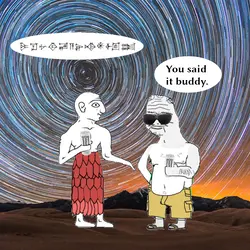
Myth as Science and Prehistoric Knowledge: Hamlet's Mill
Season 2, Episode 4
⬇️ Download now. – 🌐Torrent (preferred).
Known history is less than 1% of the time humans have inhabited earth, and thus most of our past survives only in the partial evidence of myth, genetics and badly decayed archaeological remains. In particular, mythology is not just a collection of arbitrary stories, but as the authors of Hamlet's Mill argue, it is a long-lost theoretical language used to store astronomical and scientific knowledge.
While we all know that myth can store relevant information in a memorable format, it can also embed very specific details of a preexisting system of knowledge also attested in archaeoastronomy, even in well-known sites like Stonehenge, the "neolithic calculator" which shows astronomical knowledge far more precise than that of any average person of today.
The reason the earliest philosophical and religious mythology seems absurd or opaque to us is partially because it is speaking in a jargon which has been lost, like alchemy or primeval sciences. In the right context, we can see a long tradition of knowledge preserved from at least the Stone Age.
📚 See readings and other media.
Note that pay-walled academic articles may be obtained by feeding their URLs to sites like Sci-Hub.
- Hamlet's Mill: An Essay Investigating the Origins of Human Knowledge and Its Transmission Through Myth (Giorgio de Santillana & Hertha von Dechend)
- The Origins of Scientific Thought: from Anazimander to Proclus, 600 B.C. to 300 A.D. (Giorgio de Santillanna)
- Stonehenge: A Neolithic Computer (Gerald Hawkins)
- Learn the Ancient Babylonian Math System! (YouTube video series)
🕓 See timecodes and topics.
0:00:00 Issuing an Extension on Human Prehistory0:02:24 An Argument from Plausibility for R*ddit Soyentists0:05:17 Constant Emergence of Civilization0:06:31 Myth as the Science of Prehistory0:07:44 I hate Hamlet's Mill.0:10:12 Which came first: the Planets or the Gods?0:11:50 Astronomical Myths in India and the Vedic Tradition0:15:28 On Al-Biruni and his bad pronunciation0:18:00 Mythology as technical language0:20:40 Hamlet's Mill and the Precession of the Equinox0:23:15 Hamlet and his story and Cosmic Mill0:27:15 Hyperdiffusionism0:30:24 Donations https://donate.notrelated.xyz0:31:21 On podcast length and density again0:33:15 Why .ogg instead of .mp3?0:36:08 Thor Heyerdahl0:38:40 The Polynesian discovery of America, physical and genetic evidence0:43:16 Aboriginal Australians discover America in prehistory.0:50:20 On Denisovans and Homo erectus0:51:55 Diversion on Solutreans in Europe0:53:50 On alchemy and technical language0:56:19 Hipparchus and Babylonian astronomy0:57:25 Ancient Memes we use every day0:59:50 How many degrees are in a circle?1:01:20 Babylonian Math https://www.youtube.com/playlist?list=PLIljB45xT85CdeBmQZ2QiCEnPQn5KQ6ov1:03:51 Full development of science in prehistory1:04:25 Panini's Ashtadhyayi and its deductive predecessors1:06:52 The Memory Code by Lynne Kelly1:08:41 The Cosmos and Ancient Astronomy1:09:49 Stonehenge as a Neolithic Calculator1:12:25 Poverty Point1:13:12 Closing on the Precession of the Equinoxes
Myth as History: Rohl's New Chronology
Season 2, Episode 3
⬇️ Download now. – 🌐Torrent (preferred).
In one fell swoop, Egyptologist David Rohl has posited a change in Egyptian chronology that takes both Greek mythical history and the stories of the Bible out of idle lore and into historical plausibility.
By cutting and rearranging some 300 years of "dark ages," Rohl suggests that there is no gap between the legendary times of the Trojan War and the later historical Dorian Invasion. He also posits that very specific Biblical stories, such as the sojourn in Egypt, Exodus, the conquest of Canaan and the Kingdom of Israel have ample historical evidence if we start looking in Egypt's Middle Kingdom Period.
Note also that you can now support Not Related! by donating at donate.notrelated.xyz. Monthly pledges will only be charged at the start of the month if two episodes have been released in the previous month.
📚 See readings and other media.
Note that pay-walled academic articles may be obtained by feeding their URLs to sites like Sci-Hub.
- The Lords of Avaris (David Rohl)
- Exodus: Myth or History? (David Rohl)
- Patterns of Evidence (an Evangeliboomer apologetical documentary series on the Bible which in part features Rohl's revised chronology)
🕓 See timecodes and topics.
0:00:00 Introduction0:00:45 Not Related! Is Back! (https://notrelated.xyz)0:01:23 Rohl's New Chronology: Antidote to Mediocrity0:03:46 The Boring Side of Chronology (Dating Pharaohs)0:04:42 The History of the Historicity of Bible0:06:19 The Story of Genesis in 30 Seconds0:07:00 Genesis DEBOONKED? Traditional Chronology0:08:56 Hebrew Israelites in the Middle Kangdom0:10:43 Joseph's House0:12:24 Bahr Yussef and the Sad Pharaohs0:14:53 Evidence of Exodus and the Hyksos0:16:46 Jericho0:18:00 Biblical Minimalism and "Critical" Scholarship0:23:03 Amarna Letters, Saul, David, Jonathan0:25:35 Boomer Documentaries0:27:44 No Risk Not Related! Funding (https://donate.notrelated.xyz)0:29:42 Not Related! Size0:30:35 Wittgenstein's TLP and Philosophical Investigations0:31:30 t'Hooft as Chomsky and Amateur Spirit in Science0:34:44 Graham Hancock and rigor0:35:56 Marija Gimbutas and the Mother Goddess and Chalice and Blade0:38:21 Soyence and "Skeptics"0:39:55 Greek Mythology and the Trojan War0:46:11 The Greek Dark Age and Greek Lineages0:50:40 The Lords of Avaris, the Greeks and Hyksos0:56:08 Greek Myth as Egyptian History0:58:53 Cadmus, the Greek Alphabet and Hieroglyphs1:04:47 Is the Aeneid just fan-fiction?1:07:59 My personal assessment1:12:15 What's to come in Not Related!
Stoicism and Christianity: Trust the Logos!
Season 2, Episode 2
⬇️ Download now. – 🌐Torrent (preferred).
The Word became flesh and dwelt among us.
Christian theology has a mostly dusty and forgotten belonging among the Pagan philosophy of the Greek east and the early Roman Empire. While Platonic, Hermetic and Gnostic thought all reinforced or butted heads with the Early Church, Stoic thought provides some of the most important vocabulary used in the Bible, particularly by John the Evangelist.
This viewpoint presents Jesus as not the incarnation of Logos, the rational order of the universe itself, but also as the Stoic ideal. The plan of Christ is to reunite man with God's order, in the same way that Stoics attempted to submit to divine Logos.
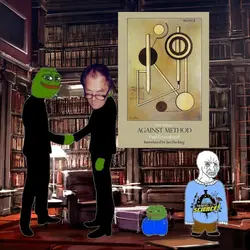
Against Method and For 'Pseudoscience'
Season 2, Episode 1
⬇️ Download now. – 🌐Torrent (preferred).
Paul Feyerabend argued for 'Epistemological Anarchism': that in order to do truly good science, one can't rule out alternative methods, ad hoc hypotheses, mythology, religion and wishful thinking. Using the example of Galileo, he shows how science's greatest strides are made by deliberately being "unscientific" in the way that court scientists tend to think nowadays.
Epistemological Anarchism is a total rejection of the so-called "demarcation problem": the attempt by early 20th century philosophers to distinguish "science" from other realms. It overturns the assumptions of logical positivism and returns us to the conception of knowledge held by antiquity, the scholastics, the Renaissance and everyone else: science can't rule out its perceived opponents by technicality or it would have also undermined the very "pseudoscientists" that developed us our scientific conceptions of today.
📚 See readings and other media.
Note that pay-walled academic articles may be obtained by feeding their URLs to sites like Sci-Hub.
- Against Method (Paul Feyerabend)
- Conjectures and Refutations (Karl Popper)
- The Structure of Scientific Revolutions (Thomas Kuhn)
- "The importance of recognising fringe science" (Gerald t'Hooft)

Season 2 Begins: Live from the Wild!
Season 2, Episode 0
⬇️ Download now. – 🌐Torrent (preferred).
The long-awaited second season begins.
What will it have in store? We'll find out soon. Be sure to consoooom previous episodes if you're new as some new episodes, while no doubt highly edifying on their own, will build off of previous episodes.
Remember that question-donations are read at the mid-episode break. You can donate at donate.notrelated.xyz. I also welcome suggestions for subjects to cover.

The Flaws of Academic Statistics: the Null Ritual
Season 1, Episode 8
⬇️ Download now. – 🌐Torrent (preferred).
Nearly every academic paper published since the 1960s has used statistics known to be faulty.
That sounds extreme, but it's actually not even controversial in the statistical literature.
In the 1950s, Ronald Fisher invented a statistical technique to solve the philosophical Problem of Induction. Neyman and Pearson developed a technique for statistical quality control in factories. Yet somehow, these two techniques were confused and merged into the Null Ritual of today, which is the neurotic pattern that every paper in many disciplines have to follow.
The Null Ritual is one of the clearest examples of academic consensus so far off the tracks that scholar treat the techniques in textbooks were religious devotion, rather than with critical awareness of what they are actually supposed to be. The end result? Nearly every field is rife with misuse of numbers, publication bias, misunderstandings and fake conclusions.
📚 See readings and other media.
Note that pay-walled academic articles may be obtained by feeding their URLs to sites like Sci-Hub.
- Rationality for Mortals (Gerd Gigerenzer)
- Mindless statistics (Gerd Gigerenzer)
- Statistical Methods and Scientific Induction (Ronald Fisher)
- "Inductive Behavior" as a Basic Concept of Philosophy of Science (Jerzy Neyman)
- Inductive Inference or Inductive Behavior: Fisher and Neyman: Pearson Approaches to Statistical Testing in Psychological Research (1940-1960) (Peter Halpin and Henderikus Stam)
- Fisher, Neyman-Pearson or NHST? A tutorial for teaching data testing (Jose Perezgonzalez)
- Why Most Published Research Findings Are False: Author's Reply to Goodman and Greenland (John Ioannidis)
- Replication, statistical consistency, and publication bias (Gregory Francis)
- "Positive" Results Increase Down the Hierarchy of the Sciences. (Daniele Fanelli)
- A Short Note on P-Value Hacking (Nassim Taleb)

Human Evolution Revised: Timelines and Multiregionalism
Season 1, Episode 7
⬇️ Download now. – 🌐Torrent (preferred).
The past ten years... even the past five years... even the past two and a half years have totally rewritten a lot of the story of human prehistory. In this episode we review a large lump of scientific papers, few having made it into popular culture or general knowledge so far, but all painting a picture of human prehistory that is much deeper and longer than the old theorists behind recent Out-of-Africa migration theories.
We talk about human settlements in unexpected places and unexpected times, hidden genetic lineages and Neanderthal seafaring, language and construction. Too often do the "Well, actually!" crowd focus on listening to partial evidence instead of using their head, and we see how this has harmed the theories in the field of paleo-history. Soon, we'll move the microscope closer to home and talk about what early humans might've been up to all that time...
📚 See readings and other media.
Note that pay-walled academic articles may be obtained by feeding their URLs to sites like Sci-Hub.
- Smith et al. 2018. Humans trived in South Africa through the Toba eruption about 74,000 years ago. Nature 555.7697. Pages 511-515.
- Richter et al. 2017. The age of the hominin fossils from Jebel Irhoud, Morocco, and the origins of the Middle Stone Age. Nature 546.7657. Pages 293-29.
- Schlebusch et al. 2017. South African ancient genomes estimate modern human divergence 350,000 to 260,000 years ago. Science 358.6363. Pages 652-655.
- Hodgson et a. 2014. Early Back-to-Africa Migration into the Horn of Africa. PLOS ONE 10.6.
- Groucutt et al. 2018. Homo sapiens in Arabia by 85,000 years. Nature Ecology and Evolution 2.5. Pages 800-809.
- Demeter et al. 2015. Early Modern Humans and Morphological Variation in Southeast Asia: Fossil Evidence from Tam Pa Ling, Laos. PLOS ONE 10.4.
- Westaway et al. 2017. An early modern human presence in Sumatra 73,000-63,000 years ago. Nature 548.7667. Pages 322-325.
- Pringle, Heather. 2011. Texas Site Confirms Pre-Clovis Settlement of the Americas. Science, New Series 331.6024. Page 1512.
- Raghavan et al. 2015. Genomic evidence for the Pleistocene and recent population history of Native Americans. Nature 505.7481. Pages 87-91.
- Skoglund et al. 2015. Genetic evidence for two founding populations of the Americas. Nature.
- Ferentinos et al. 2012. Early seafaring activity in the southern Ionian Islands, Mediterranean Sea. Journal of Archaeological Science 39. 2167-2176.
- Jaubert et al. 2016. Early Neanderthal constructions deep in Bruniquel Cave in southwestern France. Nature 111.534. 111-114.
- Coop et al. 2008. The Timing of Selection at the Human FOXP2 Gene. Molecular Biology and Evolution 25.7. Pages 1257-1259.
🕓 See timecodes and topics.
00:00 Introduction02:14 The Old Story of Human Evolution (Recent East African Origin)05:55 Philosophical Problems, bias and Absence of Evidence is not Evidence of Absence! Muh evidence-based worldview.08:58 Uniparental markers: mitochondrial and Y-chromosomal DNA and Haplogroups12:32 Genghis Khan as the last man on earth. What if he had weak genes?15:22 Muh Toba erruption is Fake News16:48 The appeal of out of Africa19:00 New archeological finds in the old strawman hypothesis20:56 Genetic analysis of Bushmen23:18 Early Humans in Arabia and Southeast Asia25:25 Destruction of Evidence and the Lost Land of Sundaland27:50 The Settlement of America and Preclovis cultures33:57 Donations and Livestreams35:05 Not the only humans36:00 What are Neanderthals?37:25 NEANDERTHALED.com38:25 Denisovans39:25 Were Neanderthals actually dumb grugs? (Seafaring)42:27 Neanderthal cave constructions45:49 Could Neanderthals and other speak? FOXP248:27 The General View of Multiregionalism and the scale of history52:26 Morphological clades between old human varieties and modern races55:30 The Red-Pill on Asian people56:16 Conclusion and "Wuz we Hyperboreans?" teaser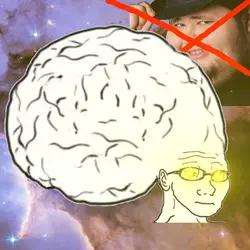
When You're Too Rational to Be Rational!
Season 1, Episode 6
⬇️ Download now. – 🌐Torrent (preferred).
Are humans rational? What would that even mean? Does it mean we follow the laws of formal logic, or does it mean we only care about getting a positive end result? Some modern psychologists, often in the vein of the Heuristics and Biases Program (à la Daniel Kahneman and Amos Tversky) often implicitly assume that these are the same thing, that humans are often gravely miscalibrated in our sense of reason. We are logically broken. Some, proponents of Libertarian Paternalism, propose that this illogicalness should be actively mitigated by governmental policy and Nudging (see Cass Sunstein and Richard Thaler's book Nudge).
But another line of thought, Ecological Rationality holds that what seems "irrational" about human behavior is only an artifact of when we fail to look at our decision-making in improper circumstances in the laboratory. What aspects of our psychology seem irrational are often mechanisms based in the wisdom of real-life risk, and far more trust-worthy than the recommendations of psychologists and behavioral economists. Sometimes even, our irrational mind is much smarter than we are.
📚 See readings and other media.
Note that pay-walled academic articles may be obtained by feeding their URLs to sites like Sci-Hub.
- Rationality for Mortals (Gerd Gigerenzer)
- Thinking Fast and Slow (Daniel Kahneman)
- Nudge (Richard Thaler and Cass Sunstein)
- What Darwin Got Wrong (Jerry Fodor and Massimo Piatelli-Palmarini)
- "Libertarian Paternalism" (Richard Thaler and Cass Sunstein)
- Environments That Make Us Smart: Ecological Rationality (Peter Todd and Gerd Gigerenzer)
🕓 See timecodes and topics.
00:00 Rationality for Big-Braned Mortals03:12 The Heuristics and Biases Program and System 1 and System 2 in Psychology07:12 Experimentations in Human Irrationality and Cognitive Illusions, the Baseball Bat example10:05 On 250% Chances12:16 Priming, framing and making money selling washing machines15:27 Biases, risks and the Hard-Easy effect17:32 A summary of Kahneman and Tversky's program18:55 I know this model isn't real... implicatures and Linda the feminist bank-teller25:23 Donations (https://donate.notrelated.xyz)27:58 tfw when too rational to be rational??? Seeds of doubt29:05 Formally rational vs. rational in the real world31:14 Ecological Rationality and the Adaptive Toolbox33:51 Formal logic is for autistes and NPCs37:33 Reconstructing human rationality in the light of uncertainty, Black Swans40:37 Returning to the Hard-Easy effect and regression to the epistemological mean41:43 The ploy of Heuristics and Biases program42:39 Richard Dawkins plays basebal with the gaze heuristic.45:34 The border between Systems 1 and 2 and the Paradox of Choice and overfitting50:23 Feyerabend vs. Gould53:11 Core assumptions54:03 What Darwin Got Wrong in the Heuristics and Biases program and emergence58:50 Libertarian Paternalism and Nudgebois, social engineering and inevitable ignorance1:04:11 Closing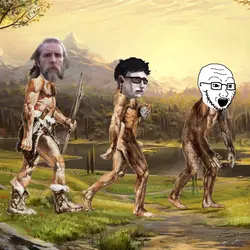
The Agricultural Revolution Has Been A Disaster for the Human Race.
Season 1, Episode 5
⬇️ Download now. – 🌐Torrent (preferred).
Whig History is one hell of a drug. In our cocoon of electronic toys and United Nations statistics about how great the world is, it might sound absurd to say that by many of the most crucial metrics, human life has become measurably worse since man adopted agriculture. Our bodies, our metabolism, our social structure, our psychology and our deepest desires are built for paleolithic life, but now that that life has been nearly entirely abandoned, we find ourselves thoroughly unfit for the marvelous technology that defines our new environment, and environment which is changing far faster than we can keep up.
Even worse, the comfort of modernity is putting us in potentially disastrous evolutionary circumstances. We are accumulating harmful mutations, while at the same time, becoming more mentally cloistered. In this episode we look at Gregory Cochran and Henry Harpending's The 10,000 Year Explosion, Spencer Wells' Pandora's Seed and Michael Woodley's work on mutational load.
📚 See readings and other media.
Note that pay-walled academic articles may be obtained by feeding their URLs to sites like Sci-Hub.
- 10,000 Year Explosion: How Civilization Accelerated Human Evolution (Gregory Cochran and Henry Harpending)
- Pandora's Seed: The Unforeseen Cost of Civilizaion (Spencer Wells)
- Western Europe, State Formation, and Genetic Pacification (Peter Frost and Henry Harpending)
- Natural History of Ashkenazi Intelligence (Gregory Cochran, Jason Hardy and Henry Harpending)
- How fragile is our intellect? Estimating losses in general intelligence due to both selection and mutation accumulation (Michael A. Woodley of Menie)
- Distance from sub-Saharan Africa predicts mutational load in diverse human genetics (Henn et al.)
- What Caused over a Century of Decline in General Intelligence? Testing Predictions from the Genetic Selection and Neurotoxin Hypotheses (Woodley of Menie et al.)
🕓 See timecodes and topics.
00:00 The Agricultural Revolution Has Been a Disaster for the Human Race01:48 Spencer Well's Pandora's Seed04:32 Cochran and Harpending's 10,000 Year Explosion06:31 Creating a world we don't match08:13 Roadmap09:05 Are we living too long for our bodies?13:04 Causes of death16:44 Meme diets18:06 Where do manlets come from?20:53 Homogenization of the agricultural diet22:56 Different racial genetic accomodations to agricultural diets27:13 Luke rationalizes not brushing his teeth.29:24 The Red-Pill on Mouth-Breathing32:02 Get me a Birthday Present! (https://donate.notrelated.xyz)32:52 Why this isn't a book club36:00 Self-Domestication39:58 We're all Soyboys.42:33 Genetic Pacification in Europe44:32 Why Chinese don't have ADHD47:09 Mad Geniuses49:50 Hawks, Doves and violence as social contribution53:35 Mutational Load, Founding Effects and Congenital Diseases (also Jews)58:48 Eugenics isn't enough1:00:08 Intelligence, g, IQ and the Flynn Effect1:04:02 In defense of Child Mortality and Inceldom1:07:46 Afrikangz confirmed for genetically superior1:09:39 The Cycle of Civilization1:13:17 Closing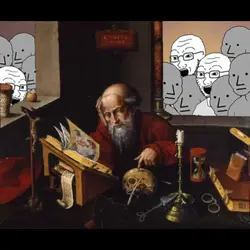
Democracy: Rule of the NPCs
Season 1, Episode 4
⬇️ Download now. – 🌐Torrent (preferred).
Does anyone even pretend to believe in democracy anymore?
As the veil of perfection of liberal democracy is now generally acknowledged to be in tatters, it's about time for normal people to start looking mechanically at what democracy really is.
In this episode, we explore the structure of a party system in democracy, Bryan Caplan (in Myth of the Rational Voter) argues that people are not randomly stupid, but systematically stupid, James Burham (in The Machiavellians: The Defenders of Freedom) tells us about Dante and the real meaning of political ideology, and SJWs absolutely annihilate Ben Shapiro and bulldoze his house down.
📚 See readings and other media.
Note that pay-walled academic articles may be obtained by feeding their URLs to sites like Sci-Hub.
- The Myth of the Rational Voter (Bryan Caplan)
- Capitalism, Socialism and Democracy (Joseph Schumpeter)
- What's Wrong with Democracy? (Loren J. Samons)
- "Dante's Politics as Wish" (James Burnham, an excerpt from The Machiavellians: The Defenders of Freedom)
- De Monarchia (Dante Alighieri)
🕓 See timecodes and topics.
00:00 Intro04:11 "Everyone but me is dumb and irrational!"07:27 The Arisalment of Public Choice and Rational Ignorance11:43 Democracy BTFO?12:52 The Miracle of Aggregation and the Wisdom of the Crowds17:21 The Democracy of Occupy Wallstreet19:42 Bryan Caplan's the Myth of the Rational Voter20:17 Rational Irrationality22:17 Systematically Brainlets?28:29 The Origin of Political Biases30:08 You can Donate Bitcoin now31:14 Emails33:30 The Urban-Rural divide in American politics35:48 Mitchell Heisman36:53 Muh pronouns38:38 IDENTITY POLITICS EVISCERATES BEN SHAPIRO WITH LOGIC42:43 Schumpeter on Public Will45:23 Logic is a Spook46:47 James Burnham's the Machiavellian's: The Defenders of Freedom47:19 Dante's De Monarchia49:30 The Real Meaning of politics and persuasion56:36 Schumpeter's Theory of Democracy as Government-seeking59:49 de Tocqueville's Great and Small Parties1:02:42 The Inanity of Third Parties1:05:49 Caplan's propositions for democracy1:08:55 Gee Bill! How come your mom lets you have TWO votes?1:10:42 Democratic localism1:13:37 Closing
Albion's Seed and an Ethnic History of America
Season 1, Episode 3
⬇️ Download now. – 🌐Torrent (preferred).
The Eternal Anglo comes in many shapes and sizes! And America is made not of a homogeneous group of Britons, but at least four systematically different ethnic groups varying by social values, dialect, dress, gender relationships, religion, worldview. These ethnic groups create the regionalisms of today's America and also have affected superstrate populations after them.
This episode surveys David Hackett Fischer's monumental work Albion's Seed: Four British Folkways in America. We talk not only about these four ethnic groups, which will sound very familiar, but also on a history of the United States, particularly its most significant political battles, interpreted through this ethnic lens.
🕓 See timecodes and topics.
00:00 The End of End of History01:43 Albion's Seed03:08 Intro and organization04:22 Brief survey of the four groups09:21 How to write a term paper.10:05 The Eternal Puritan, their Moral Consensus and Ethnostate17:23 Patriarcha!21:53 Thot Patrol and Incel Rage25:57 We wuz aristocrats?29:10 I'M LITERALLY QUAKING RN30:40 Open Borders for Pennsylvania! ( ͡° ͜ʖ ͡°)32:18 What are thoumst even talking about?35:17 The Borderer42:39 Back already43:21 Bugmanism45:40 THICC Donations46:56 What is capitalism to Schumpeter?49:16 RIP Terry Davis50:12 Comments from the Cryptonomicon51:53 Back to Albion's Seed: MUH FREEDOM1:00:27 An Ethnic History of the United States1:03:24 Andrew Jackson1:08:09 Abraham Lincoln and the Civil War1:11:32 Postwar Puritan Supremacy1:13:04 Reconstruction: PURTIANS GET OUT1:15:50 Border Nationalism Now!1:17:30 Regionalism and the New Deal Coalition1:20:10 DR3 and the Party Inversions1:27:37 Non-white Immigration, Hart Celler Act1:29:18 Obama and Trump1:35:55 Finishing up Democracy
Capitalism, Socialism and Democracy
Season 1, Episode 2
⬇️ Download now. – 🌐Torrent (preferred).
Joseph Schumpeter, self-described "greatest lover in all Vienna" penned the book Capitalism, Socialism and Democracy, which not only still serves as an insightful rejoinder to mainstream economics, but also might be Patient 0 for the ironic Black Pill.
Schumpeter dismisses the autistic formalism of perfect competition and market modeling and casts the economy as a battle not for a stagnant market positions, but a gradual, evolving system whose main goal is the development of new means of production and the overthrowing of their inefficient predecessors, a process he termed Creative Destruction. Monopolistic competition is the natural state of the market, and desirable at that. He also prophecies the end of capitalism as we know it, but also the rise of a socialist government which might look a little more familiar than we anticipate...
📚 See readings and other media.
Note that pay-walled academic articles may be obtained by feeding their URLs to sites like Sci-Hub.
- Capitalism, Socialism and Democracy (Joseph Schumpeter)
- The Economics of Imperfect Competition (Joan Robinson)
- General Theory of Employment, Interest, and Money (John Maynard Keynes)
🕓 See timecodes and topics.
00:00 Introduction to Capitalism, Socialism and Democracy and Joseph Schumpeter01:36 What level of irony are you on?03:16 The Invention of the Black-pill04:14 Name-dropping05:20 The Context: Socialism and Keynes08:49 Schumpeter on Capitalism10:14 Capitalism and Inequality (Le 99% Face)12:33 The Virgin Perfect Competition17:46 Profits are people too!19:44 The Virgin Equilibrium21:26 Agree and Amplify! Creative Destruction25:06 How Capitalism Causes Autism27:20 Why Soyboys and Catladies don't have children or the Holy Grail29:45 Hostile Elites and European-Style Socialists33:26 Daddy, why is my schoolteacher a communist?36:10 Donate: https://donate.notrelated.xyz37:44 Comments on the Origin of Consciousness in the Breakdown of the Bicameral Mind39:45 Luke responds to an NPC47:41 The Rise of Socialism (but ironically)48:56 Can my version of True Socialism survive?49:14 This is where we talk about von Mises (libertarians will click here)53:25 Cargo Cult Capitalism55:09 China as Schumpeterian Socialism55:56 Schumpeter as Troll56:52 Mises again58:24 "Da Socialists r da real Capitalists!"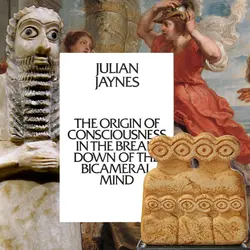
The Origin of Consciousness in the Breakdown of the Bicameral Mind
Season 1, Episode 1
⬇️ Download now. – 🌐Torrent (preferred).
Inspired by the vastly different mindset and cultural and religious structure of ancient civilizations, the psychologist Julian Jaynes put for the radical notion of the Bicameral Mind, which posits that ancient people, indeed all people in their more natural environment are not actually conscious.
Consciousness, to Jaynes, was a mental habit that gradually developed in the period after the Bronze Age collapse, around 1200 BC. Before that, the two hemispheres of the brain were separate, and mental deliberation appeared to people as divine inspiration.
As utterly mad as this theory first sounds, the cultural, psychological, archaeological and linguistic evidence for it is grounds for more than a pause. Join us for a journey through the Iliad, Mesopotamia, the oldest prophets of the Bible and more on the first episode of Not Related!.
🕓 See timecodes and topics.
00:00 The Origin of Consciousness in the Breakdown of the Bicameral Mind10:00 Consciousness generally17:11 Consciousness and qualia19:43 What should we expect from the Bicameral Mind22:39 Emails and User Comments Economics, quantitative methods, Marxism, Big-Branded Nihilism, Emergence, Are rocks conscious?, J.F. Gariepy, Don't go to college.34:00 A Greek Vocabulary Lesson38:57 Le Bronze-Age Collapse Mindset (the Chad Achilles)43:05 The Eternal Odysseus and Solon44:50 Whomst are all these voices in my head?46:53 The Trump inside your head48:28 How to Organize a Bicameral Theocracy (Not saying it was aliens, but...)54:39 Amos and Ecclesiastes57:53 The Rise of the Fedora in the Middle East59:28 The Words for the Bicameral Voices1:01:46 Prophecy1:07:20 Music and Poetry1:10:40 Psychological states, schizophrenia and possession1:11:43 The best of the theory and lacunae1:14:58 Extensions and the Julian Jaynes Society1:16:17 Big-Braned Levels of Consciousness1:18:00 Anime pillows
An Introduction to Not Related! and to Luke Smith
Season 1, Episode 0
⬇️ Download now. – 🌐Torrent (preferred).
Luke introduces his self and the podcast and the principles and reasons behind it.